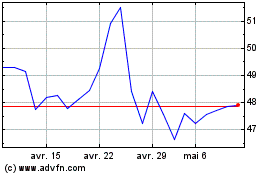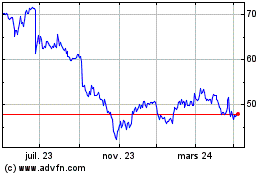LONDON—Shares in Burberry Group PLC fell sharply Thursday after
the British fashion house reported a big fall in first-half
same-store sales, amid lower spending in Hong Kong and mainland
China.
The disappointing results are further testing Chief Executive
Chris Bailey, Burberry's longtime creative director, who has
presided over a period of lackluster growth since taking the reins
from former CEO Angela Ahrendts last year.
Revenue for the six months ended Sept. 30 came in at £ 1.1
billion ($1.7 billion), unchanged from the same period last year,
as growth at its retail operations was offset by a weaker
performance at its wholesale and licensing arms. Analysts polled by
FactSet had expected revenue of £ 1.16 billion.
Burberry shares plunged 12% in early trading in response to the
downbeat figures, which the company blamed on traveling Chinese
consumers and its geographic mix. The shares were down 9.6% in
early afternoon.
A weaker euro has made shopping in Europe cheaper, a trend that
has hammered Burberry's results in recent quarters as the British
brand is relatively small on the continent compared with rivals.
Separately, wealthier Chinese consumers are increasingly traveling
to Japan to buy luxury goods, a country that currently makes up
just 2% of Burberry's wholesale and retail revenue.
"The second quarter was a difficult quarter driven by the macro
environment," Chief Financial Officer Carol Fairweather said on a
call with reporters. Speaking about Chinese shopper she said: "We
want to make sure that wherever they travel we can serve them
brilliantly but the way they've traveled this quarter has amplified
the numbers."
Exane BNP Paribas analyst Luca Solca said Burberry had
significantly missed his second-quarter expectations, describing
the results as "weak."
Retail revenue rose to £ 774 million from £ 748 million, while
same-store sales climbed just 1%, a marked slowdown from the 10%
increase reported for the same period last year. "In the second
quarter, demand from luxury consumers, particularly Chinese
customers, was affected by a more challenging external
environment," the company said.
Wholesale revenue fell to £ 305 million from £ 317 million and
licensing revenue—which includes revenue from the company's beauty
business—dropped to £ 26 million from £ 35 million.
"The external environment became more challenging during the
half, affecting luxury consumer demand in some of our key markets.
In response, we have intensified our focus on driving sales and
productivity, while taking swift action on discretionary costs,"
Mr. Bailey said.
Burberry said it expects adjusted profit before tax for fiscal
2016 to between £ 434 million to £ 461 million.
Revenue fell 2% to £ 377 million in the Asia-Pacific region. The
region, Burberry's largest by revenue last year, has suffered a
slowdown as the Chinese government has cracked down on corruption
and a weaker euro has encouraged Chinese shoppers to buy
abroad.
Burberry said same-store sales in the Asia-Pacific region were
impacted by a continued—and deeper—decline in Hong Kong in the
second quarter compared with the first. In mainland China,
comparable sales decreased slightly in the half, in the context of
weakening consumer sentiment in the market in the second
quarter.
"The fact that Burberry has above sector-average exposure to the
Chinese consumer is not helping given increasing Chinese macro
concerns," said RBC analyst Rogerio Fujimori in a recent note ahead
of Burberry's results.
Other luxury companies have struggled, too, with Prada SpA last
month reporting its net profit fell by almost a quarter in the
first half as sales slumped in mainland China and Hong Kong.
Ms. Fairweather said Burberry has moved to cut costs in an
attempt to mitigate the impact that weaker sales could have on
full-year profit. The company has frozen new hiring, except for in
its retail business, and has cut spending on travel among other
measures.
In Japan, the world's second-largest luxury market, the company
recently ended a 45-year pact with its last Japanese licensee,
deciding that it wanted to take full control of its brand. Ms.
Fairweather said Burberry is "significantly underpenetrated" in
Japan but is now moving to increase its presence.
In the Americas, Burberry reported revenue rose 6% to £ 286
million. Revenue edged up 1% to £ 416 million in Europe, the Middle
East, India and Africa. Burberry said 60% of revenue in the region
is generated from the traveling luxury customer, with same-store
sales growing by over 20% in Italy, France and Spain in the first
half. The U.K.—which makes up one-third of the EMEIA region's
retail revenue—did less well as the strength of the pound against
the euro discouraged shoppers from spending there.
Since 2012, when Burberry decided to take control of its beauty
and fragrance following the end of a long-term licensing deal with
Interparfums SA, the company has been working to gain more share in
the beauty market. It has launched new fragrances and opened a
small handful of beauty-focused stores. Revenue from the beauty
division climbed to £ 82 million from £ 79 million a year
earlier.
Write to Saabira Chaudhuri at saabira.chaudhuri@wsj.com
Subscribe to WSJ: http://online.wsj.com?mod=djnwires
(END) Dow Jones Newswires
October 15, 2015 08:45 ET (12:45 GMT)
Copyright (c) 2015 Dow Jones & Company, Inc.
Interparfums (EU:ITP)
Graphique Historique de l'Action
De Mar 2024 à Avr 2024

Interparfums (EU:ITP)
Graphique Historique de l'Action
De Avr 2023 à Avr 2024
